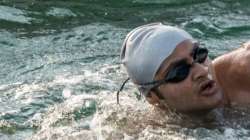Indian swimmer Aryan Singh equals world record after swimming Sea of Galilee in 1st attempt
Sea Of Galilee is the second lowest water body in the world, approximately 214 metres below sea level.

Aryan Singh Dadiala, Indian swimmer, on Friday, created history by equalling the existing world record. He became the joint fastest swimmer to swim the Sea of Galilee braving extreme weather conditions. Sea of Galilee is the second lowest water body in the world. It is approximately 214 metres below sea level and poses multiple challenges to the swimmers such as whirlpools and indefinite wind storms.
Dadalia is the first swimmer from Asia to swim the Sea of Galilee. He had the hogged the limelight to set the world record in November 2022 as well in Goa after finishing the 32 km open water sea swimming in only 5 hours and 36 minutes. As for his feat of swimming the Sea of Galilee, it was his first ever attempt and he scaled it like a champion.
He started to swim at 5:18 AM on Friday when it was pitch dark and cold, finished the swim exactly at 11:33 AM to become the joint fastest male swimmer to swim the Sea of Galilee in the first attempt.
Aryan's father Surjeet Dadiala was proud of his son and also called it a proud moment for the entire country. "Aryan faced many weather-related and physical challenges during his swim, such as heavy winds and fatigue but was firm and focussed on his swimming," he said while speaking to PTI.
The event was observed and certified by Galilee Marathon Swimming Association, Israel and flagged off by Indian diplomat Pawan K. Pal, who leads the public diplomacy division at the Indian embassy in Tel Aviv. "Aryan Singh Dadiala, a 21 yr old Indian swimmer breaks barriers and swam across the #SeaofGalilee (20.
5 km length) in 6hrs 15 mins. Congratulations to this young talent for displaying incredible feat of determination and skill", a tweet from the Indian mission read.
Aryan Singh was accompanied by his entire family during this attempt and he is keen on taking up such huge challenges in the near future as well.
(Inputs from PTI)